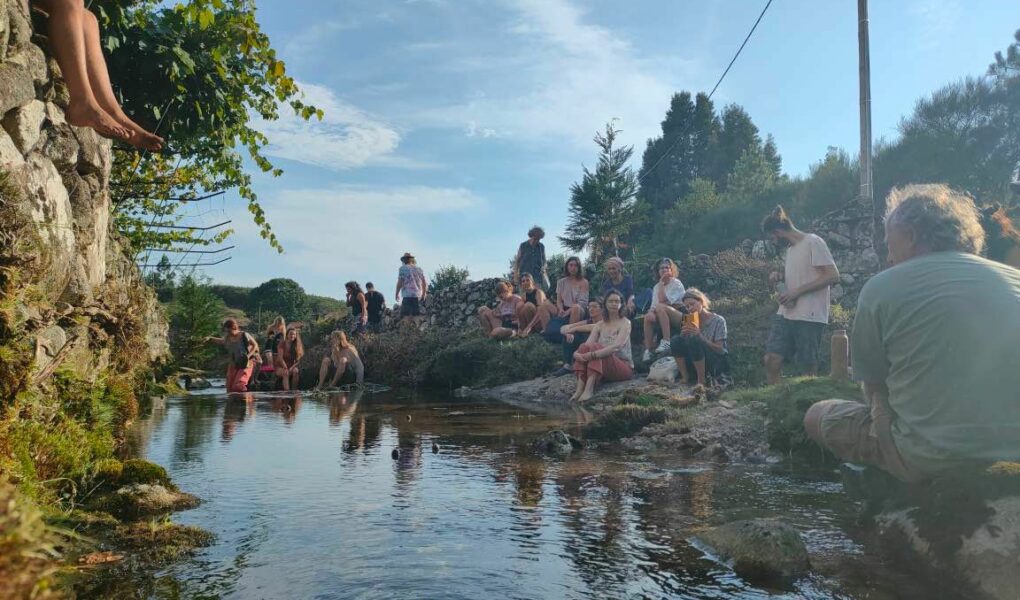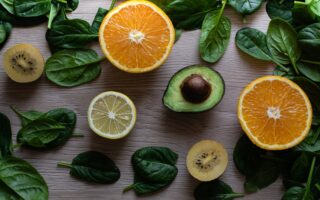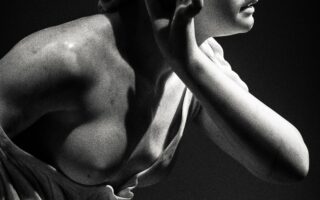Author: Marina Nobre
In this 10-day experience in the mountains of Portugal, we took participants from the individual dimension of health self-knowledge and awareness to community skills, collective decision-making, and environmental regeneration; this spiral of understanding from micro to macro is our way of showing that in order to heal the earth, we must heal ourselves in all of our aspects, become balanced beings, and contribute to the planet’s larger processes.
.
.
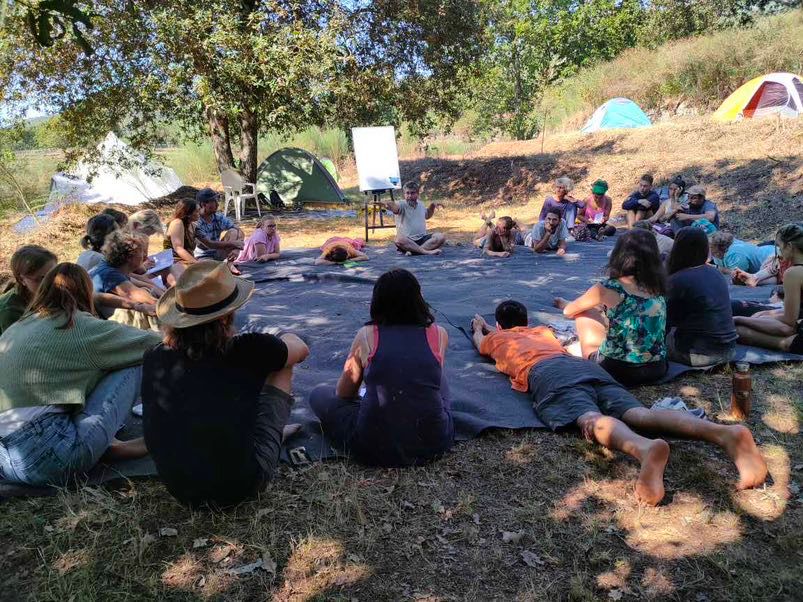
.
.
We had a group of 40 people from 8 different European countries come to Soajo, in northern Portugal, to embark on this ecological healing experience with us, at a project co-funded by Erasmus+.
We started off feeling the surroundings and connecting with the land, learning about our partners at Joyas da Terra, where the course took place, a permaculture and agroforestry project embodied by the beautiful family of Yassine Benderra and Joana Costa and their 2 children. After all the presentations and collective agreements, we set out on our journey.
.
.
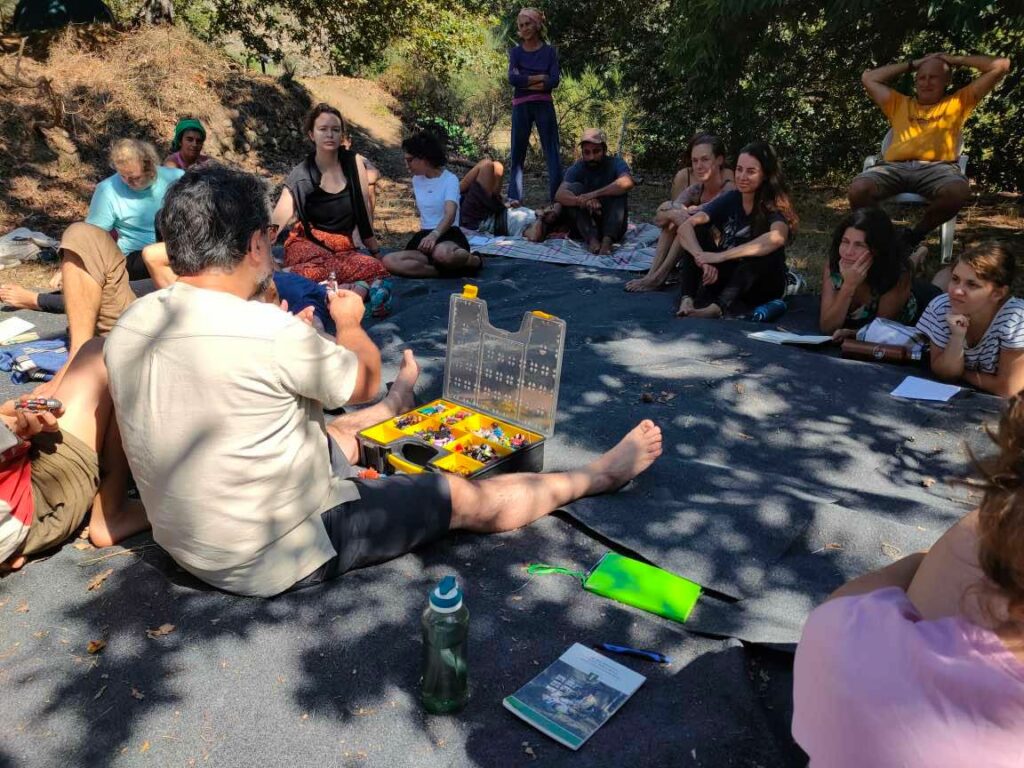
.
Marina Nobre, one of Reflorestar Portugal’s co-founders, a permaculture and agroforestry specialist, and a Chinese medicine specialist, was the first speaker. It was with this holistic knowledge about the human body, the connection with the cycles of the earth, the five elements, and natural health processes that we started this path with the participants, ending the class with a self-massage moment so everyone could feel their own body and gain tools of self care. This is significant because we are all parts of a collective system, whether it is social or environmental in nature, and we, as individuals, need to be healthy in order to give our gifts to the world.
Knowing this, we where blessed with allways drinking the purest mountain spring water and we prepared an all-natural, vegetarian healing diet through the course as well as morning body-mind routines such as yoga, stretching, meditation, bioenergetic exercises, and an ecstatic dance session to alleviate tensions and let loose! Dancing moves our liver Qi, our creative energy, and releases lots of endorphins and serotonin, helping to relax the body and mind – very good for people suffering from depression and anxiety.
.
.
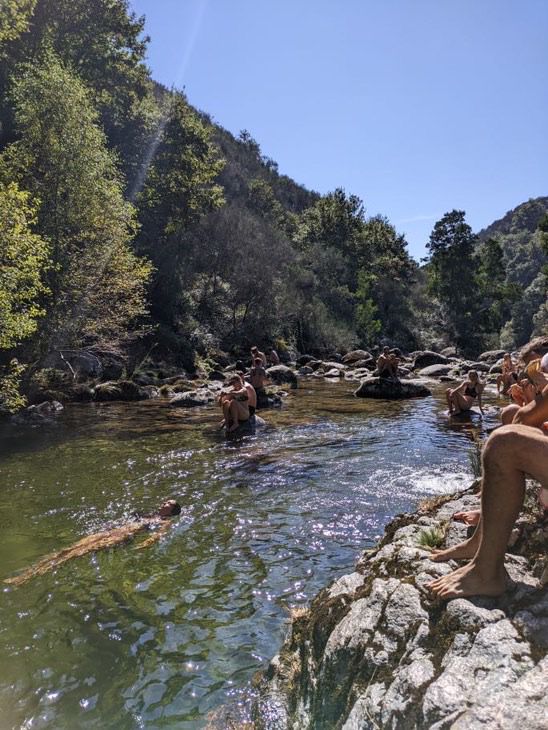
.
.
Continuing the thread we started to show the importance and connection of our body, specifically our gut health, with the health of the soil, one of our main focuses in this journey of land regeneration at Reflorestar Portugal is to bring back life in soils, making them full of good bacteria, fungi, and small insects to nourish plants and retain water in the landscape while fixing carbon in the soil. A soil full of microlife means that the food grown in it will be more nourishing, full of vitamins and minerals, as well as bacteria that will also enter our bodies and colonize in a good way, promoting gut health. When soils are depleted, the food that comes from them is also depleted of life and nourishment, creating nutritional imbalances in the human body. The relationship between gut microbiota and brain health has been extensively researched; having a healthy microbiota is essential for developing a positive mental state.This was very well approached by our other co-founder, Susana Guimarães, a communication specialist, agroforester, and herbalist, and by Joana Costa, a biologist, permaculture designer, yogi, and soil expert, in their workshops.
So as to gain more tools on how to care for our gut, we set out to teach simple foods we can do at home, such as fermented foods, live food sprouts and probiotics, green juices, and vegetable milks, with Joana Guardão who is an activist for live food and gave us all the good and yummy recipes.
.
.
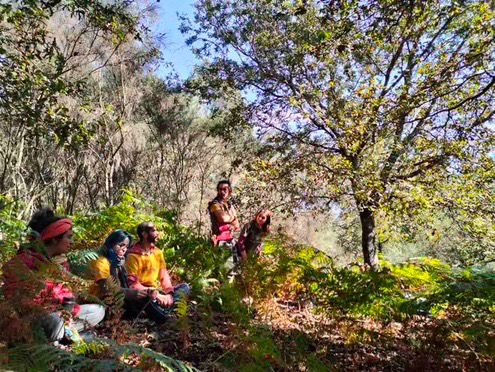
.
.
When it comes to the health of the body and the environment, cosmetic products are also a concern; many of these products contain toxic components and endocrine disruptors such as parabens, and their plastic recipients are also a source of pollution, so we set out to teach how to make natural cosmetics such as soap and toothpaste with the goal of creating resilience and freedom through knowledge and independence from industrial processes and unhealthy chain product chains.
After approaching this relationship with the body, the environment, food, and products, we started to introduce the concepts of mental health, self-knowledge, and spiritual well being because we are not just material beings and we feed ourselves through our emotions and minds as well. Pedro Nobre, who is a psychotherapist with a spiritual approach, took us through his vision of the soul and the universe, talking about the need to search for ourselves and care for our spiritual evolution. Mariana Cortesão added her touch, connecting us to the spirits of the earth with a beautiful water ceremony where we were taken to the river to contemplate the beauty and gifts that we receive from the water that allow us to be on this planet. A silent walk and meditation by the river helped us remember that thankfulness and appreciation are spiritual gifts needed to feel peace and well being.
The next days, we would begin our journey to the “collective” with Paulo Xavier who is a psychologist and a corporate consultant. With his Dyospiros technique, he helped us understand ourselves through our archetypes, so as to fit like puzzle pieces together, each person with their own talents and limitations, to create powerful teams where everyone is seen and heard for who they are. After that, Virginia Santos, a sociologist and social technology facilitator, took the group on a journey to learn about collective project creation and decision making with Dragon Dreaming techniques and Sociocracy principles. Theory and practical exercises were sprinkled with group energizers to create more and more group connection among the participants. Experiencing group dynamics is very important to exercise our skills and boundaries, to take us out of our comfort zones, and to confront us with different ways of thinking and doing things. The more we practice, the better we will be at collective problem solving and collaborating, which are very needed for community peace and social health so that we all can thrive together.
And because not all is work and learning, we had the opportunity to take a day off in the beautiful scenery of the mountains of Soajo in northern Portugal, where there is still a lot of wild life with wild cows and horses walking around freely, a place full of fresh water springs, rivers, and waterfalls. We took a walk in the local village and went for a swim in its cold waterfalls to relax.
.
.
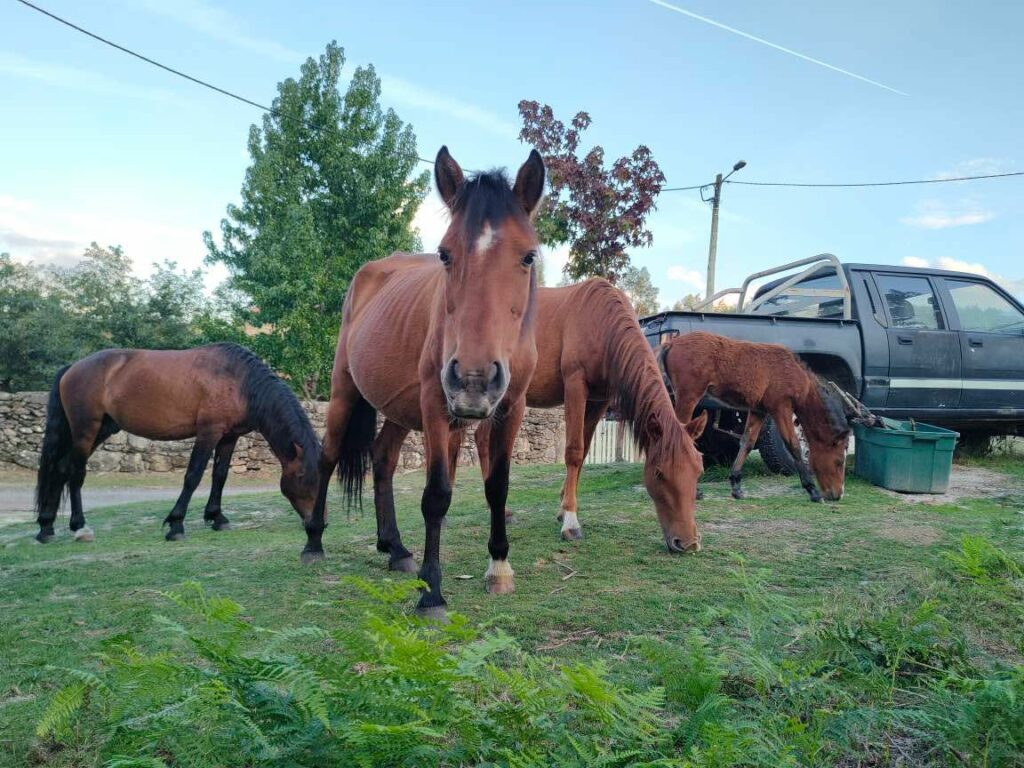
.
.
The following days were dedicated to the land, how we relate to it and how we can have a positive impact on the planet. Permaculture, agroforestry, and reforestation techniques were the main focus. Learning to plant our own food and read and interact with the landscape are essential skills for self-sufficient and regenerative humans.
Yassine and Joana took over the permaculture day, sharing their experience and expertise. We were able to firsthand experience what it is like to live in a nearly entirely self-sustainable house or community, with examples of bioconstruction, dry toilets, composting, a vegetable garden, and so on; a hands-on experience to inspire those who want to transition to a sustainable lifestyle. At the end of that day, we went for a walk on the mountain and learned about the plants and how to recognize them, pure medicine available to everyone!
.
.
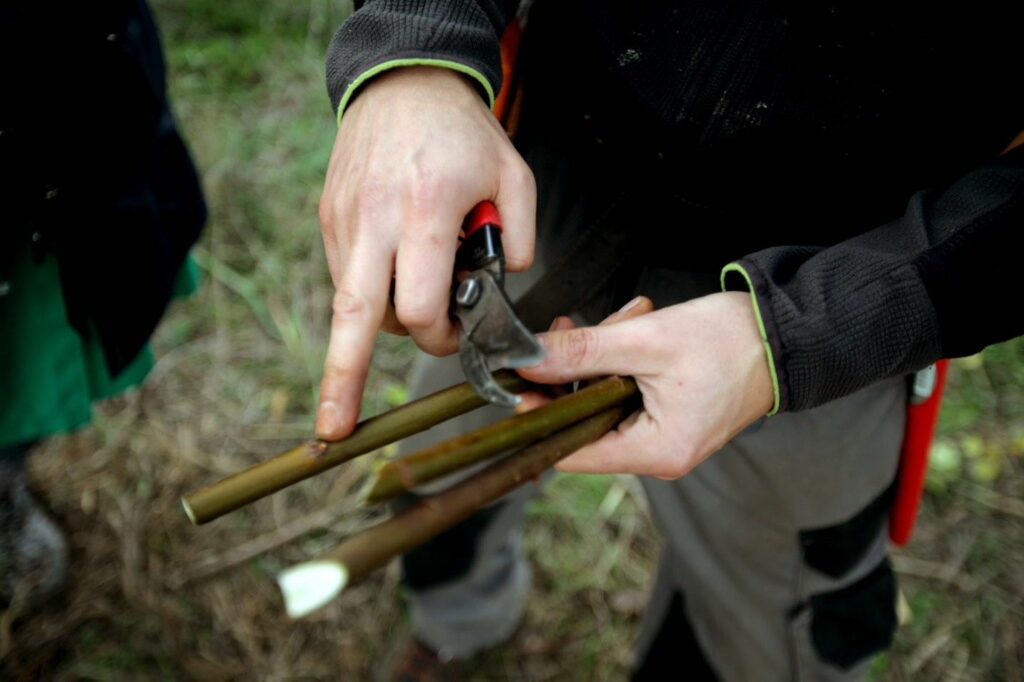
.
.
Last but not least, the final aspect of the course was entirely dedicated to land regeneration, reforestation techniques, and the principles of syntropy, guided by Vasco Valle, a researcher and agroforester, and Susana Guimarães, both of whom aimed to give our participants the tools to be able to collaborate in this great endeavor of our time: to heal the earth.
Syntropic agroforestry applies the understanding that nature works through cooperation and unconditional love to create ever more complexity within a living system; the more relationships and consortia we can put together, the more functions will take place and balance the ecosystem. We learned about the ecological succession of species and stratification, and how that can help us understand which plant to put where and when, always aiming to create density and biodiversity. We also learned about seeds and how to organize organic matter on the soil and why that is so important when it comes to regenerating depleted soils. First, we visited the agroforest and observed all the relationships established by the different species and what could be done to improve that system. Next, we went to a piece of land that was full of brumbles and other wild growing plants and learned practical tools on how to approach forest maintenance and pruning techniques to help the natural regeneration happening there. Understanding that we as humans can have a positive impact and actually accelerate natural regeneration brings us closer to the land, which is empowering and inspiring, and is an important step to reintroducing ourselves back into our natural habitats to create thriving living systems.
.
.
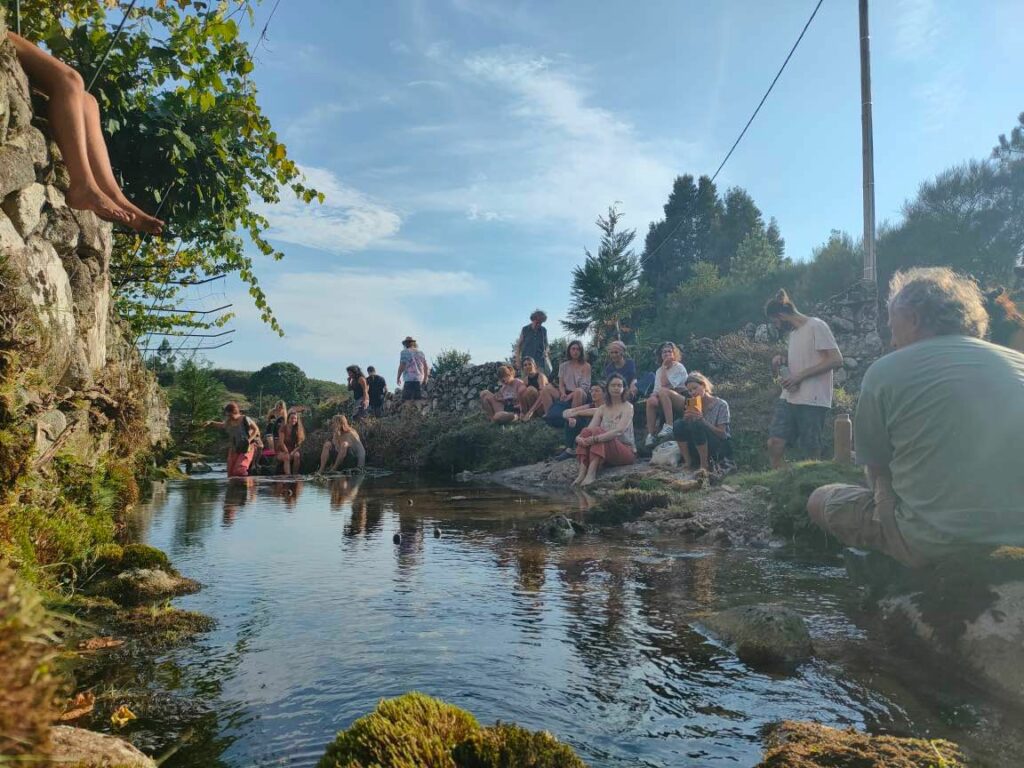
.
.
We were humbled and filled with gratitude to be able to receive all of these beautiful people from so many different places, who also shared their knowledge while receiving our input in this Ecohealing journey. Thank you for being a part of it and reading this story.
This is introductionary to our partners in Portugal. If you want to know any more about it, follow this link:
https://www.patreon.com/ReflorestarPortugal/posts
And if you are interested in what they have to say, click here:
ttps://www.gesellschaft-und-spiritualitaet.de/slp/susana-guimaraes/

